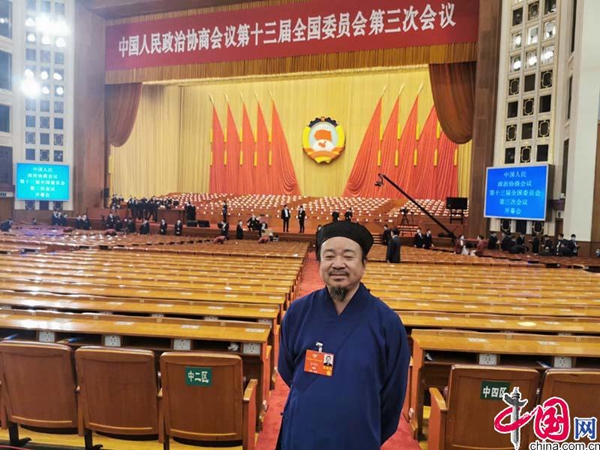Taoist master plans future for vacated religious buildings
- By Zhang Rui
 0 Comment(s)
0 Comment(s) Print
Print E-mail China.org.cn, May 27, 2020
E-mail China.org.cn, May 27, 2020

A Taoist master brought a proposal about how to deal with vacated religious properties to the ongoing session of China's top political advisory body.
Taoist master Huang Xinyang, a member of the 13th National Committee of the Chinese People's Political Consultative Conference (CPPCC) and vice president of the China Taoist Association, suggested a coordinated effort with the Beijing government to return vacated religious buildings in Beijing's historic areas to local religious groups.
Beijing's central axis is to apply for World Heritage status in 2035. Fourteen historical places sit along the axis, including Qianmen, the Forbidden City, Jingshan Park, and Tian'anmen Square. Preservation work on these sites should meet the requirements of the application by 2030.
In recent years, in order to speed up the renovation of old and dilapidated buildings in historical and cultural protection areas, the Beijing Municipal Government successively launched various urban projects, and pledged to continue to strengthen its efforts for the World Heritage push.
Beijing's Xicheng and Dongcheng district governments identified many religious properties occupied by residents and relocated the residents to vacate the buildings for further protective restoration, repair, and renovation.
Huang suggested the CPPCC, officials, and relevant government departments should pay more attention to and help coordinate the return of the buildings back to religious groups and organizations, and guide them to handle real estate registration.
After the return, local governments should also follow up and communicate with religious groups and organizations about how to better use these properties. At the same time, religious groups and organizations would also use religious properties to display Chinese traditional culture, in accordance with the bid for World Heritage status.






Go to Forum >>0 Comment(s)